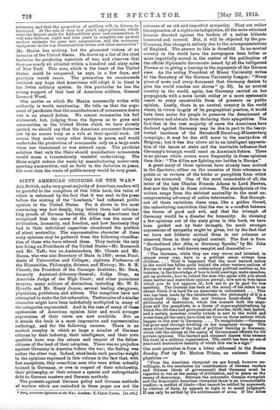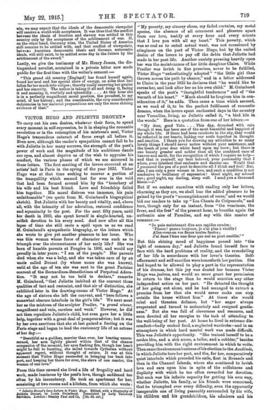SIXTY AMERICAN OPINIONS ON THE WAR" Are. British, and a
very great majority of American, readers will be grateful to the compilers of this little book, the value of which is enhanced by the fact that it was sent to the press before the sinking of the ' Lusitania ' had inflamed public opinion in the United States. For it shows in the most convincing way how deeply, long before these last culmina- ting proofs of German barbarity, thinking Americans had recognized that the cause of the Allies was the muse of civilization, humanity, and freedom, and how fearlessly they had in their individual capacities abandoned the position of silent neutrality. The representative character of these sixty opinions may be gathered from the following classifies,- Lion of those who have uttered them. They include the only two living ex-Presidents of the United States—Mr. Roosevelt and Mr. Taft; two ex-Ambassadors, Mr. Choate and Mr. Bacon, who was also Secretary of State in 1899 ; seven Presi- dents of Universities and Colleges ; eighteen Professors of the Humanities, Philosophy, Science, and History; Mr. B. H. Church, the President of the Carnegie Institute; Mr. Beek, formerly Assistant-Attorney-General ; Judge Gray, an Associate Judge of the High Court; and other prominent lawyers; many authors of distinction, including Mr. W. D. Howells and Mr. Henry James; several leading clergymen, physicians, publishers, and editors. The compilers have not attempted to make the list exhaustive. Testimonies of a similar character might have been indefinitely multiplied in many of the categories represented. And in the case of many of theee spokesmen of American opinion later and much stronger expressions of their views are now available. But as it stands the book is a most impressive and representative anthology, and for the following reasons. There is no neutral country in which so large a number of German citizens by their industry, their intelligence, and their civic qualities have won the esteem and respect of the fellow- citizens of the land of their adoption. There was no prejudice against Germany in America before the war ; the feeling was rather the other way. Indeed, what lends such peculiar weight to the opinions expressed in this volume is the fact that, with few exceptions, they come from men who were either actually trained in Germany, or owe in respect of their scholarship, their philosophy, or their science a special and unforgettable debt to German masters and German methods.
The protests against German policy and German methods of warfare which are embodied in these pages are not the
• Mott durriam Opinion. vs Pit War. London; T. Fisher Gavin, [1s, nets]
outcome of an old and imperfect sympathy. They are rather the expression of a righteous indignation, all the more reluctant because directed against the leaders of a nation hitherto honoured and revered. But, it rill be objected by the pro- Germans, this change is entirely due to the misrepresentations of England. The answer to this is threefold. In no neutral country in the world have the newspapers been better or more impartially served in the matter of the publication of the official diplomatic documents issued by all the belligerent Powers or in giving a hearing to the exponents of the German view. As the acting President of Miami University writes to the Secretary of the German University League: "Every piece of news and every document that Germany desires to give the world reaches our shores" (p. 33). In no neutral country in the world, again, has Germany carried on her propaganda with a more lavish outlay or a more systematic resort to every conceivable form of pressure on public opinion. Lastly, there is no neutral country in the world where, in virtue largely of its geographical position, it would have been easier for people to preserve the detachment of spectators and abstain from declaring their sympathies. The fact that in the vast majority of cases the Americans have declared against Germany may be dee in part to the heavy- heeled insolence of the Bernstorff-Dernburg-11finsterberg campaign ; it may be due still more to the martyrdom of Belgium; but it was due above all to an intelligent apprecia. tion of the issues at stake and the inevitable influence that Germany's triumph would exert on America's future. There is no phrase which occurs more frequently in these opinions than this "The Allies are fighting our battles in Europe."
A great many of these opinions have already been noticed in the Spectator, either on the occasion of their utterance in public or in reviews of the books or pamphlets from which they are extracted. One of the most remarkable of all, the letter of the late Charles Francis Adams to Lord Newton, first saw the light in these columns. The standpoints of the writers range from the strictest neutrality to the most un- compromising advocacy of active intervention. But through. out all these variations there runs, like a golden thread, the unhesitating conviction that the war is a conflict between the forces of good and evil, and that the triumph of Germany would be a disaster for humanity. In choosing a few opinions out of the sixty given in this book, we have been guided not by their strength, for much stronger expressions of sympathy might be given, but by the fact that we have not hitherto noticed them in our columns or observed them in their original context. The first is from "Deutschland titer Allen, or Germany Speaks'," by Mr. John Jay Chapman, a well-known essayist and dramatist :--
" The Germans, while they are very clever and talented, in almost every way, have in a political sense always been children. . . . Thus it happened that the most learned nation in the world has fallen quite behind the other western nations of Europe in regard to certain rudimentary political matters as, for instance, in the knowledge of how to hold meetings, make speeches, get up protests ; how to collect the men who agree with you about some matter and make their opinion prevail; how not to vote taxes which you do wit approve of; how not to go to gaol for free speaking. The German has been at the mercy of his rulers to as extent which it is hard for an American to understand. . . . This war has been made by the intellectuals ; the philosophy of it is a study-brod thing like the new German bomb-shells. That philosophy of destruction, which lies beneath both the siege- guns and the pamphlets, is a tissue of super-sophistication, by which the old-time and gross passions of murder, theft, lust, hatred, and a certain nameless cruelty (which is new to the world and worse than all the rest), have been let loose on those nations which happen to live next to Germany. . . . To recapitulate :—Germany has gone mad through dwelling on her imaginary wrong'. This came about because of the lack of political training in Germany, which left the citizen at the mercy of Government of for his private opinions. The learned and eloquent classes thus became the tools of a military organisation. The result has been an era of panic and destructive insanity of which this war is a sign."
Our next quotation is from a letter addressed to the Boston Sunday Poet by Dr. Morton Prince, an eminent Boston physician "From the American viewpoint we are forced, however un- willingly, to the conclusion (in consideration of German warfare and German ideate of government) that Germany must be regarded in war ea the enemy of civilisation, and in peace es the enemy of democracy. Between the autocratic German viewpoint and the democratic American viewpoint there is an irreconcilable conflict—e. conflict of ideals—that cannot be settled by argument. by citation of facts, by appeals to logic or to morel judgment. It can only be settled by the arbitrament of arms, If the Allies win, we may expect that the Ideals of the democratic viewpoint will receive a world-wide acceptance. It was thus that the conflict between the ideals of freedom and slavery was settled in this country only by the acceptance of the arbitrament of war. If, On the other hand, Germany wins, the United States of America still remains to be settled with, and that conflict of viewpoints, between American democratic ideals and German autocratic ideal., will ■till exist, to be settled some day in the future by the arbitrament of the sword."
Lastly, we give the testimony of Mr. Henry James, the dis- tinguished novelist, contained in a private letter now made public for the first time with the writer's consent
"This grand old country [Englapd] has found herself again, found her soul and her special store of energy, on sides that had fallen far too much into eclipse; thereby really renewing her genius and her sincerity. The nation is taking it all and doing it, facing it and meaning it, worthily and splendidly. . . . At this hour she is in a perfectly magnificent moral position, the proudest, to my mind, of her history ; and the considerable, the very considerable deficiencies in her material preparations are only the more shining evidence of that,"



































 Previous page
Previous page